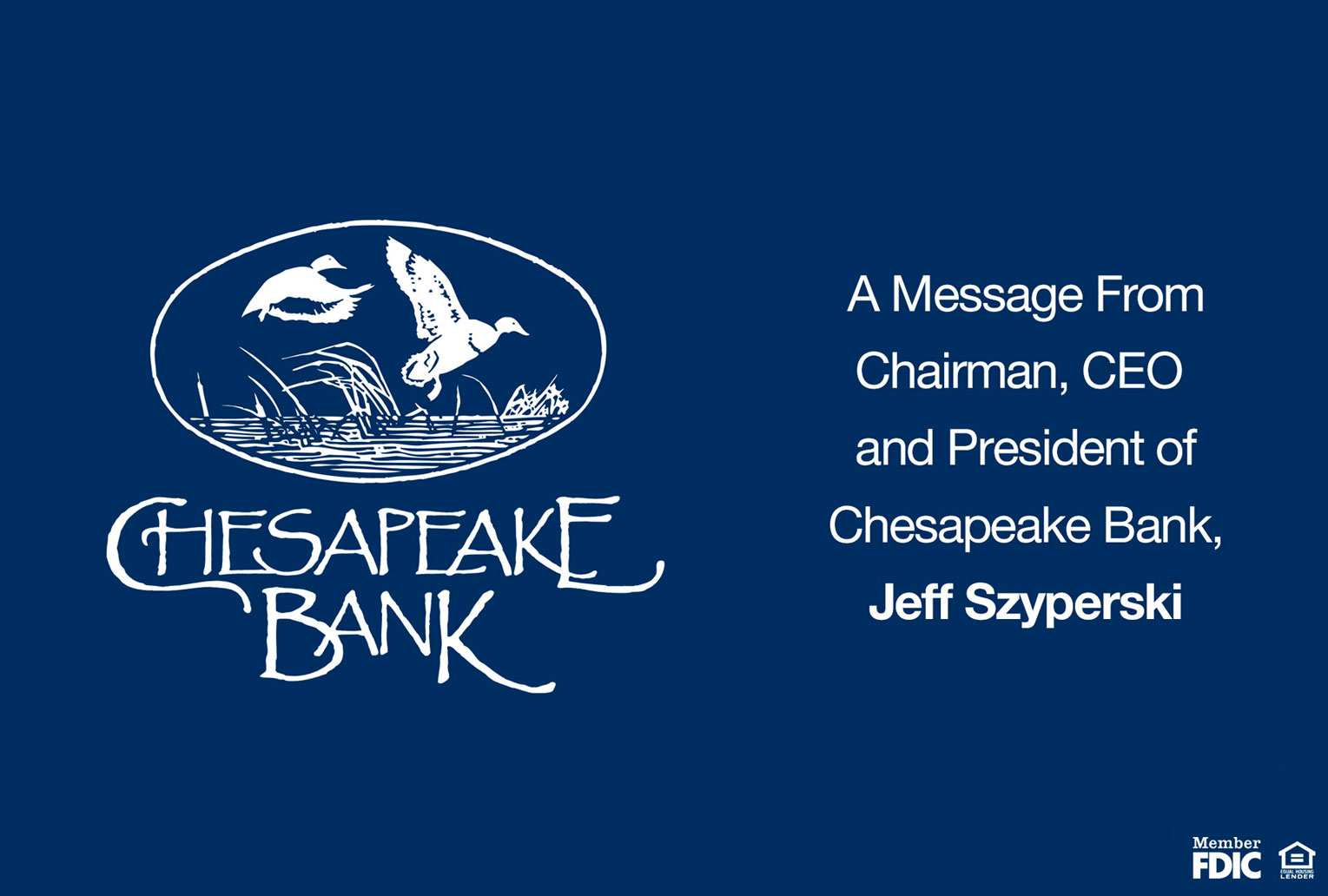- Home
- It's All About Community
- Chesapeake Bank Blog
- A Message from our Chairman, CEO and President, Jeff Szyperski

A Message from our Chairman, CEO and President, Jeff Szyperski
Jeff Szyperski, the Chairman, CEO and President of Chesapeake Financial Shares, Inc., shares some thoughts on the strength and soundness of Chesapeake Bank, and why this will continue.
Hello, I'm Jeff Szyperski, President and CEO of Chesapeake Bank. I know there's no dearth out there now of analysis of the Silicon [Valley] Bank failure and Signature Bank in New York. But I guess there's room for a little bit more opinion.
I do feel the need to get some facts on the table, as I think it relates to us here at Chesapeake bank. In not so much what caused it to happen but why I believe it does not apply to the industry in general. And to us, in particular, here, Silicon Valley Bank and Signature Bank, which was a crypto issue, Silicon Valley Bank, was an entirely tech-focused bank, a large bank very successful in what they did. And for about 40 years, they succeeded in what they did. But they were focused on a particular industry segment.
I think, from the get-go, they had a higher risk profile for that reason alone. Secondly, I read an article that only 3% of their deposits fell under the FDIC-insured limit of $250,000. For instance, our number, a comparable number for that, is over 60%. So, they had a large percentage of their deposit base subject to a higher level of volatility and concern as it relates to FDIC insurance.
You have the tech, higher risk concentration, company composition, and the deposit base higher compensation, and slather on to that. I think what happened is some venture capitalists got together with their customers, who did a lot of dealings with Silicon Valley Bank and recommended getting their money out of that bank. I think that was fuel on the fire. And that was the stake in the heart that caused the final run on the bank.
The other banks in the country don't have an array of facts or factors that would multiply upon each other, causing such a run on the bank. I mean, we definitely don't have that here at Chesapeake Bank. I think trying to throw all these banks into this one big umbrella as to why there was a failure of Silicon Valley Bank, you really need to understand the root cause and the distinction of what initiated the whole problem.
You hear a lot about the mismatch of the investment in their bond portfolio. That was a byproduct of what I previously mentioned, but that was not the cause in and of itself. So that was part of their solution set to get out of the run on the bank, which caused them to have to go into their bond portfolio that was underwater, but that in and of itself was not the causal reason. It was the three factors I mentioned before, in my opinion.
You know for us, other than heightened communication, thus far has been a non-event for us. I think the fact that we communicated well, I think the fact that we earnestly try to be thoughtful and transparent and truthful with our customer base over time, that's just how we do business. And that's what we delivered.
I think that's largely the reason why it's been a non-event for us. But we don't ever want to hide by anything, we behind anything, we want to make sure we are as forthright as we can possibly be. And I think that has an ear to our benefit during this mini-crisis, for lack of a better term.
One other point I'd like to make is you see on the news a lot that the taxpayers are bailing out with the FDIC agreeing to insure all the deposits. Taxpayers do not pay a dime for that. The FDIC fund is an insurance fund, and all the premiums for that fund are paid for by banks. Same with the 2008 crisis.
The FDIC fund that paid for the TARP money lent to banks was entirely paid back with interest to the U.S. government. If there's any hit on the FDIC fund for making good on the Silicon Valley and Signature Bank deposits, that cost will be borne by the banking industry, not taxpayers.
That is a little-known fact and easily glossed over in the media. What does it ultimately mean for banking? Time will tell. Honestly, I think one thing that won't change is banks, especially community banks, are invested in the well-being of their community. That won't change. I think that's a symbiotic relationship that has existed before and will continue thereafter.
Perhaps events like this further strengthen the need for that, or people's visibility of why that isn't so important will strengthen over time. A possible byproduct, but really time will tell. And thank you for indulging me this time. This is helpful, and if you have any questions, please reach out and contact us. We would love to communicate what we can.
-
Categories
Posts by Topic
- Business (98)
- It's All About Community (73)
- Personal Finance (70)
- CFS News (49)
- Employees (46)
- Northern Neck (37)
- Middle Peninsula (34)
- Chesapeake Payment Systems (27)
- Richmond (26)
- Williamsburg (20)
- Fraud & Security (17)
- Home Buying (12)
- Chesapeake Wealth Management (11)
- Flexent (11)
- Customer Testimonials (7)
- COVID-19 (6)
- Chesterfield (5)


